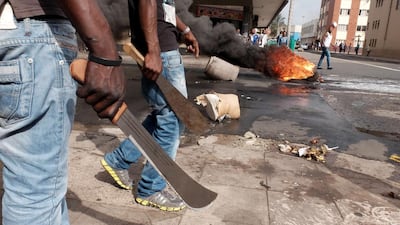The xenophobic violence gripping South Africa will probably die down in the coming days, but the underlying reasons for the outbreak won’t dissipate soon.
The current spate of violence directed at African nationals was fuelled by remarks by the Zulu king, Goodwill Zwelithini, who told supporters that foreigners were everywhere and that they “dirty” South African streets with their “unsightly goods”. The king also called on the South African government to ask foreigners, whom he compared to “lice”, to pack their bags and return to their countries of origin. The remarks sparked riots, similar to those that engulfed the country in 2008, leaving seven dead, hundreds injured, thousands displaced and many foreign-owned shops destroyed.
Why is the scourge of racial street violence engulfing the rainbow nation? The South African press has been awash in explanations, most of which focus on the slow pace of racial integration since the fall of the apartheid regime in 1994.
The machete-wielding attackers are poor South Africans and they have found a convenient scapegoat in African migrants and asylum seekers who arrive in South Africa as a result of violence in their home countries or to look for a better economic future.
Perceived South African exceptionalism also plays a factor. There is a commonly held belief that South Africa maintains a singular place on the African continent. The apartheid experience was singular. The wealth and diversity of the economy is singular. Therefore, South Africans approach immigration and the presence of black foreigners with a particularly isolationist view. While the country has one of the strongest economies on the continent, this view is limited given the role that many African countries played in the toppling of the apartheid regime.
The underlying reason for this violence boils down to economics. Apartheid, at its core, was driven as much by economic interests as racism. The regime was structured to ensure that a select minority – the white population – maintained total dominance over the country’s mineral wealth. Racial legislation was merely the vehicle by which this system of colonialism was administered.
When apartheid ended in 1994, South Africa was unable to break free from this economic infrastructure, partly due to the concentration of wealth and the fact that the country’s resources were not nationalised, as they were in Zimbabwe. The white minority lost its government but it gained international acceptance – former president FW de Klerk even received a Nobel Peace Prize. More importantly, it maintained control over the economy it closely guarded.
While there have been many important achievements since 1994, including the creation of one of the most progressive constitutions on earth, the African National Congress has failed to unravel the system of economic exploitation and injustice that apartheid entrenched in South African society. It is no coincidence that expelled ANC firebrand Julius Malema recently started his own political party called the Economic Freedom Fighters.
Looking at the country today, we can see important lessons for other conflict areas around the world, especially in Israel and Palestine. In apartheid South Africa, the minority population sought to control the country’s mineral wealth by any means necessary. It does so in democratic South Africa as well. The same can be said of Israel, which maintains its occupation of the West Bank not for security reasons but to control water resources and use the Palestinian territories as a giant laboratory for its expansive weapons industry.
Resolving the ethnic, racial and religious fault lines in these countries is the easy part, as unlikely as that statement might seem in Israel and Palestine. Unravelling the economic structures that allow a select few to dominate a country’s wealth is the hard part. Until the distribution of wealth is better addressed in South Africa, xenophobic violence will continue to rear its ugly head.
jdana@thenational.ae
On Twitter: @ibnezra

